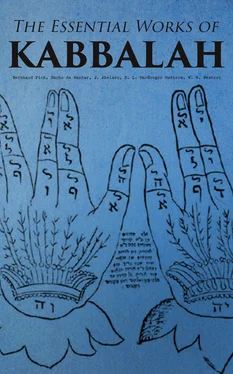Closely connected with the doctrine about evil is that of the Messiah. His coming takes place when the kingdom of the Keliphoth is overcome through the pious and virtuous life of men here on earth; then also takes place the restoration of the original state of affairs (tikkun). Since under his rule everything turns to the divine light, all idolatry ceases, because the Keliphoth no longer seduce men to apostasy. Cabala as mistress, rules then over the slave philosophy. In the upper world, too, great changes take place at the coming of the Messiah. The king again has intercourse with the queen. Through their copulation the divinity regains the destroyed unity. But Wunsche says that cabalistic literature, especially the Zohar, often describes this union of the king and the queen in terms bordering on shamelessness and shocking to decency and morals.
The whole universe, however, was not complete, and did not receive its finishing stroke till man was formed, who is the acme of creation, and the microcosm uniting in himself the totality of beings. 7The lower man is a type of the heavenly Adam Kadmon. 8Man consists of body and soul. Though the body is only the raimant or the covering of the soul, yet it represents the Merkaba (the heavenly throne-chariot). All members have their symbolic meaning. Greater than the body is the soul, because it emanates from the En Soph and has the power to influence the intelligible world by means of channels (sinnoroth) and to bring blessings upon the nether world. The soul is called nephesh, "life," ruach, "soul," and neshama, "spirit." As ncshama, which is the highest degree of being, it has the power to come into connection with God and the realm of light; as ruach it is the seat of good and evil; as nephcsh it is immediately connected with the body and is the direct cause of its lower functions, instincts, and animal life.
Psychology.—Like Plato, Origen, etc., the Cabala teaches a pre-existence of the soul. 9All souls destined to enter into human bodies existed from the beginning. Clad in a spiritual garb they dwell in their heavenly abode and enjoy the view of the divine splendor of the Shechinah. With great reluctance the soul enters into the body, for as Zohar, II, 96b, tells us, the soul, before assuming a human body, addresses God: "Lord of the Universe! Happy am I in this world, and do not wish to go into another where I shall be a bondmaid, and be exposed to all kinds of pollutions." Llere, too, we notice again the influence of Platonic and Philonian doctrines. In its original state each soul is androgynous, and is separated into male and female when it descends on earth to be born in a human body. At the time of marriage both parts are united again as they were before, and again constitute one soul (Zohar, I, 9lb). This doctrine reminds us of Plato and Philo no less than that other (viz. of 10But it is interesting to learn of the destiny of man and the universe according to the Cabalists.
It is an absolute condition of the soul to return to the Infinite Source from which it emanated, after developing on earth the perfections, the germs of which are implanted in it. If the soul, after assuming a human body, fails during its first sojourn on earth to acquire that experience for which it descends from heaven, and becomes contaminated by sin, it must re-inhabit a body again and again, till it is able to ascend in a purified state. This transmigration or gilgul, however, is restricted to three times. "And if two souls in their third residence in human bodies are still too weak to resist all earthly trammels and to acquire the necessary experience, they are both united and sent into one body, so that they may be able conjointly to learn that which they were too feeble to do separately. It sometimes happens,, however, that it is the singleness and isolation of the soul which is the source of the weakness, and it requires help to pass through its probation. In that case it chooses for a companion a soul which has more strength and better fortune. The stronger of the two then becomes as it were the mother; she carries the sickly one in her bosom, and nurses her from her own substance, just as a woman nurses her child. Such an association is therefore called pregnancy (ibbur), because the stronger soul gives as it were life and substance to the weaker companion."
This doctrine of the Superfoetatio was especially taught by Isaac Loria or Luria. It is obvious that this doctrine of the Ibbur naturally led to wild superstition and fraudulent thaumaturgy. Loria himself claimed to have the soul of the Messiah ben Joseph. Connected with Loria's system is the doctrine of the Kawana, by which is meant the absorbed state of the soul in its direction towards God when performing the ceremonies, in prayer, self-mortification, in the pronunciation of the divine name and reading of the Zohar, whereby the bounds are broken and the fulness of blessing from the upper world is brought down upon the lower.
The world, being an expansion of the Deity's own substance, must also share ultimately that blessedness which it enjoyed in its first evolution. Even Satan himself, the archangel of wickedness, will be restored to his angelic nature, since he, too, proceeded from the Infinite Source of all things. When the last human soul has passed through probation, then the Messiah will appear and the great jubilee year will commence, when the whole pleroma of souls (otzar ha-neshamoth), cleansed and purified shall return to the bosom of the Infinite Source and rest in the "Palace of Love" (Zohar, II, 97a).
Mystic Interpretation.—The exegetical ingenuity of the Cabala is interesting to the theologian. The principle of the mystic interpretation is universal and not peculiar to one or another school, as every one will perceive in ecclesiastical history, and even in the history of Greek literature. We find it in Philo, in the New Testament, in the writings of the fathers, in the Talmud, and in the Zohar; and the more such an interpretation departed from the spirit of the sacred text, the more necessary was it to bring the scriptures to its support by distortions of their meanings. 11
Passing over all manner of subtleties of the pre-Zoharic times, we will consider the masterly performances of the Cabalists. According to them the letters, words and names of the scriptures contain divine mysteries of wondrous, mystical thoughts and ideas, of significant symbols and riddles, on which depends the continuance of the world. (Zohar, II, 99a). "Is it conceivable," the Zohar makes one of Simon ben Jochai's circle exclaim, "that God had no holier matters to communicate than these common things about Esau and Hagar, Laban and Jacob, Balaam's ass, Balak's jealousy of Israel, and Zimri's lewdness? Does a collection of such tales, taken in their ordinary sense, deserve the name of Torah? And can it be said of such a revelation that it utters the pure truth? If that is all the Torah contains, we can produce in our time a book as good as this, aye, perhaps better. No, no! the higher, mystical sense of the Torah is its true sense. The biblical narratives resemble a beautiful dress which enraptures fools so that they do not look beneath it. This robe, however, covers a body, i. e., the precepts of the Law, and this again a soul, the higher soul. Woe to the guilty, who assert that the Torah contains only simple stories, and therefore look only upon the dress. Blessed are the righteous, who seek the real sense of the Law. The jar is not the wine, so stories do not make up the Torah" (ibid., Ill, 152a). Thus the Cabalists attached little importance to the literal sense; yet not a single iota was to be taken from it and nothing was to be added to it (ibid.j II, 99).
In order to elicit the mysteries from the scriptures, the Cabalists employed certain hermeneutical canons, 12viz.:
1. Gematria, 13i. e., the art of discovering the hidden sense of the text by means of the numerical equivalents of the letters. Thus from the Hebrew words והבה שלשה (vehineh sheloshah) translated "lo! three (men stood by him)" in Gen. xviii, 2, it is deduced that these three were the angels Michael, Gabriel and Raphael, because the letters yield the numerical value of 701, viz,
Читать дальше












